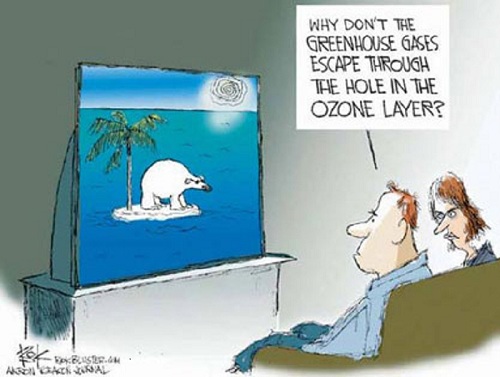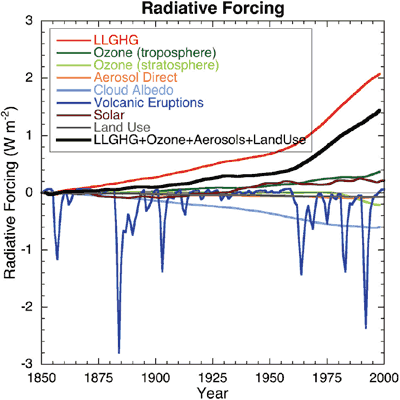2012 SkS Weekly Digest #29
Posted on 23 July 2012 by John Hartz
SkS Highlights
In An American Heatwave: The United States Glimpses its Hot Future, Rob Painting explains why an increase in record-breaking warm extremes is simply a logical consequence of a warming climate, because it raises the odds of weather fluctuations breaking heat records. As one might expect, Rob's very topical article garnered the most comments of those posted during the past week.
Toon of the Week

Quote of the Week
Robert Gifford, a psychologist at the University of Victoria in British Columbia who studies the behavioral barriers to combating climate change, calls these habits of mind "dragons of inaction." We have trouble imagining a future drastically different from the present. We block out complex problems that lack simple solutions. We dislike delayed benefits and so are reluctant to sacrifice today for future gains. And we find it harder to confront problems that creep up on us than emergencies that hit quickly.
Source: We’re All Climate-Change Idiots by Beth Gardiner, New York Times, July 21, 2012
Issue of the Week
Should SkS broaden its horizon to include analyses of proposed geo-engineering solutions to climate change mitigation?
Scientific Term of the Week
Industrial revolution: A period of rapid industrial growth with far-reaching social and economic consequences, beginning in Britain during the second half of the eighteenth century and spreading to Europe and later to other countries including the United States. The invention of the steam engine was an important trigger of this development. The industrial revolution marks the beginning of a strong increase in the use of fossil fuels and emission of, in particular, fossil carbon dioxide. In this report the terms pre-industrial and industrial refer, somewhat arbitrarily, to the periods before and after 1750, respectively.
Source: Annex I (Glossary) to Climate Change 2007: Working Group I: The Physical Science Basis, IPCC Fourth Assessment Report.
The Week in Review
A complete listing of the articles posted on SkS during the past week.
- Joe Romm's Congressional Testimony by Dana
- Yes, Virginia, There is Sea Level Rise by greenman3610
- Esper Millennial Cooling in Context by Dana
- The Mid-Wales floods of June 2012: a taste of things to come? by John Mason
- Vision Prize Results by Dana
- An American Heatwave: The United States Glimpses its Hot Future by Rob Painting
- New research special - methane papers 2010-2011 by Ari Jokimäki
Coming Soon
A list of articles that are in the SkS pipeline. Most of these articles, but not necessarily all, will be posted during the week.
- New research special - satellite measurement papers 2010-2011 (Ari Jokimäki)
- Climate Change Cluedo: Anthropogenic CO2 (Tom Curtis)
- Mercury - The Hidden Danger of Arctic Warming? (Steve Brown)
- Nature has invented the ideal method to sequester carbon: coal (Sarah)
- Tar Sands Oil - An Environmental Disaster (Dana)
- Skeptic Magazine vs. Heartland and Monckton Cherrypicked Denialism (AlexC and Dana)
SkS in the News
Doug Bostrom's What is the Climate Science Legal Defense Fund? was re-posted by Climate Progress.
Dana's Michaels and Cato Unwittingly Accept the Climate Threat was also re-posted by Climate Progress.
SkS Spotlights
The International Pacific Research Center (IPRC) was conceived under the "U.S.-Japan Common Agenda for Cooperation in Global Perspective" and was established October 1997 in a cooperative agreement among the University of Hawai'i, the Japan Marine Science and Technology Center, and the National Space Development Agency of Japan. Located within the UH ManoaSchool of Ocean and Earth Science and Technology (SOEST), the center currently operates under a cooperative agreement between the University of Hawai'i (UH) and Japan Agency for Marine-Earth Science and Technology (JAMSTEC).
IPRC's core support comes from the State of Hawai'i through UH and from our principal supporting scientific agencies: JAMSTEC in Japan, and NASA and NOAA in the US. Financial support for our research is also provided by other government agencies in the US and international agencies.
The IPRC welcomes private donations to support its activities.
Details about our research efforts can be found at Research, Scientific Publications, Annual Reports, and in issues of the IPRC Climate, our semiannual Newsletter. From a small beginning, the center now has over 40 Ph.D. research scientists and an annual budget of roughly 7 million dollars.































 Arguments
Arguments























 0
0  0
0 Please note the dashed red line, ie, the net effect of anthropogenic forcings.
There are two primary natural forcings, solar and volcanic aerosol emissions. These are shown in the following graph by the IPCC as brown (solar) and dark blue (volcanic):
Please note the dashed red line, ie, the net effect of anthropogenic forcings.
There are two primary natural forcings, solar and volcanic aerosol emissions. These are shown in the following graph by the IPCC as brown (solar) and dark blue (volcanic):
 Unfortunately the figure does not carry through to 2010. In the intervening period, however, solar irradiance has declined. I am uncertain about the volcanic aerosol forcing, but it cannot be very large due to the absence of recent large volcanoes near the equator.
Unfortunately the figure does not carry through to 2010. In the intervening period, however, solar irradiance has declined. I am uncertain about the volcanic aerosol forcing, but it cannot be very large due to the absence of recent large volcanoes near the equator.







Comments